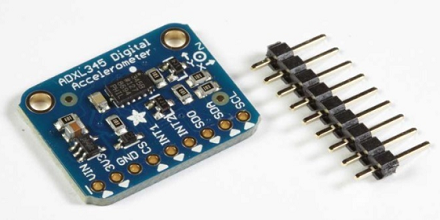
The ADXL345 is a small, thin, low-power triaxial accelerometer that provides high-resolution (13-bit) measurements of acceleration up to ±16g. The digital output data is in 16-bit twos complement format and can be accessed via SPI (3-wire or 4-wire) or I2C digital interface. Great for mobile device applications. It can measure static gravitational acceleration in tilt detection applications, as well as dynamic acceleration due to motion or shock. Its high resolution (4 mg/LSB) is capable of measuring dip changes of less than 1.0°.
The device offers several special detection functions. Activity and inactivity detection detects the presence or absence of motion by comparing acceleration on any axis to user-set thresholds. The tap detection function can detect single and double vibrations in any direction. Free fall detection can detect if the device is falling. These functions can be independently mapped to one of the two interrupt output pins. Integrated memory management system uses 32-level first-in, first-out (FIFO) buffers that can be used to store data, minimizing host processor load and reducing overall system power consumption
Low-power modes enable intelligent motion-based power management for threshold sensing and motion acceleration measurements with low power consumption. The ADXL345 is available in a 3 mm × 5 mm × 1 mm, 14-pin small, thin plastic package. ADXL345-EP supports defense and aerospace applications (AQEC standard)